Former National Secular Society (NSS) President Terry Sanderson, a giant of the secularist and gay rights movements, among others, died in June 2022. Below, Keith Porteous Wood, Terry’s partner and current NSS President, writes about the recent commemoration of Terry at the site of his grave at Brookwood, near Woking, Surrey.

On 6 April 2024, friends of Terry Sanderson assembled at his newly erected grave to celebrate his life. He was the President of the NSS 2006-2017. In 2017 Terry was honoured to be awarded le Prix de la Séparation des Églises et l’État in Paris by the International Association of Freethinkers. This was just one of the many ways in which his many achievements were recognised by the global secularist community.
The grave, at Brookwood near Woking, Surrey, near NSS founder Charles Bradlaugh’s, takes the form of an open book in recognition of Terry’s brilliance as a writer. The inscription on the grave describes him as a ‘gay rights campaigner, writer, journalist, social worker, President of the National Secular Society 2006-2017’ and says that ‘he spent his whole life trying to improve the lives of others’. It also records the last words he wrote: ‘Try to be kind to each other’.
Terry died on 12 June 2022, aged 75, after five years of a cancer-related illness which he bore with characteristic uncomplaining bravery. In 2017, he had a massive operation and had to be revived on the operating table. On 12 June 2022, he died at our home, as he wished, rather than in a hospice.
Leading the ceremony, I chronicled Terry’s life, which started on 17 November 1946 in a South Yorkshire mining village where in the 1940s and 1950s poverty was extreme. His exceptional writing talents emerged in his early years at school and he organised plays in which the local children took part.
Even by the late 1960s homosexuality had been only partly decriminalised in England and Wales and there was great hostility to and ignorance about it, particularly in such macho environments as the one Terry grew up in. Nevertheless, Terry bravely declared his homosexuality, even to his parents, in the local newspaper. To assist the many isolated gay people in the area, Terry set up a telephone helpline and distributed gay books by mail order. He fought the local council’s ban on gay events such as discos on their premises, ostensibly because the staff would not like them. So he booked the venue for a birthday party with a hundred guests, all gay, and asked the staff whether they objected. ‘Not at all,’ they responded, ‘it was a lot more civilised than most such events here.’ Predictably, the council did not back down, but it was forced to do so after Terry appealed to the national ombudsman.
Soon after we met, in 1981, and he moved in with me in London, he started writing gay self-help books. They helped a generation of people come to terms with their sexuality. Readers of these books, some famous, still pay tribute to their transformative effect on their lives.

Terry then embarked on writing a monthly feature column for Gay Times drawing attention to the latest examples of the widespread homophobia in the media which became very popular. This necessitated reading every newspaper, long before they were online, which he did for 25 years. I still wonder how he retained his sanity! Crucially, he used the information he gleaned as the basis for relentless complaints to the Press Complaints Commission (PCC). A former member of the PCC said that ‘Terry Sanderson made our lives hell!’ Over the years, these complaints were treated with increasing seriousness and its rulings led to the virtual elimination of homophobia in the press. In turn, this materially reduced the incidence of homophobia in public discourse. Today, even what had been the worst offending newspapers in the 1980s-2000s now write neutral, even supportive, articles about gay people.
Terry and I were always secularists, in part because we considered that the churches were a major obstacle to gay liberation and equality. So, when the leadership of the National Secular Society became vacant in 1996, he encouraged me to abandon my career in commerce and apply for the job, to which I was appointed. He then helped me build up the Society’s membership through his wonderful writing and expertise in broadcasting. He joined the Council and eventually became President. The two achievements of the NSS while he was President of which he was most proud were: (a) the abolition of the blasphemy law, which had been an objective of the Society since its foundation in 1866, and (b) arranging the biggest demonstration against a Pope ever. This was the protest over the state funding of Benedict XVI’s visit to the UK in 2010. The demonstration in central London extended to well over a mile.
His writing also included humorous books and plays, and he was a film director manqué. One of his films was a powerful documentary about his hero Marlene Dietrich, detailing both her ever-evolving artistic career and her bravery in helping the Allied war effort, to the fury of the Third Reich. As long-time friend Malcolm Trahearn said at the commemoration, Terry ‘was no doubt inspired by her fierce beliefs in individualism and freedom. She was openly and “notoriously” bisexual, and an atheist.’ Malcom further recalled that Terry had ‘commissioned a half-life-size mannequin of Marlene, from an American artist, which he displayed in an illuminated glass case in the living room. She presided over so many evenings, glittering in sequins and mink.’ He compiled numerous variety shows screened as benefit performances for London’s Cinema Museum each Christmas. He was also, for three years, an agony aunt on Woman’s Own.

It is remarkable that he achieved all this while holding down a full-time job as a social worker helping adults with learning difficulties, which he did with great empathy and very effectively. Decades later, many of those people still remember him.
My tribute at the graveside was followed by leading academic Professor Paul Johnson, Dean of Social Sciences at Leeds University, praising Terry’s work as a writer and communicator. Paul said that Terry’s book How To Be A Happy Homosexual (1986, followed by several new editions) was a ‘response to enormous levels of state-sanctioned and institutionalised homophobia. Terry delivered a message to gay people: you can be happy and, crucially, your happiness is in your own hands.’ Paul believed that Terry was ‘one of the twentieth century’s greatest contributors to promoting gay rights and establishing equality for gay people.’ Paul quoted this beautiful and ever-relevant passage from the book:
‘There is no convincing reason to deny yourself full expression as a gay person. … It has been proved, over and over again, that gay people can be happy, as long as they give themselves permission. … You will be freed from the control of other people’s opinions and manipulations. Your happiness will be the paramount motivation in your life.’
The NSS’s CEO Stephen Evans added an affectionate and humorous epitaph. This was followed by a delicious meal, as Terry would have thought essential, during which his favourite music was played, including some Frederick Delius.
The event concluded with numerous anecdotes from guests, some amusing and others poignant. They had a common thread: Terry’s brilliance, bravery, humility, kindness, and charm. It is amazing how many people, some of whom had only met him for a few minutes, had been enchanted by him.
See here for more photos of Terry and Keith and for photos and videos from the 6 April 2024 commemoration.
The text on Terry’s gravestone

‘Terry Sanderson, 17 November 1946-12 June 2022.
His whole life was spent improving the lives of others. The last words he wrote: “Try to be kind to each other.” Gay rights campaigner, writer, journalist, social worker, President of the National Secular Society 2006-2017.
Beloved partner of Keith Porteous Wood.’


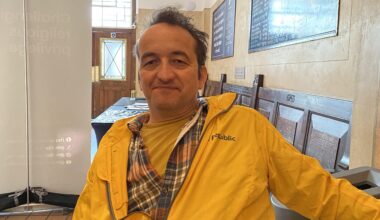

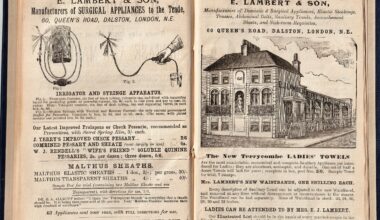
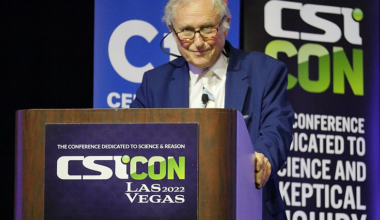
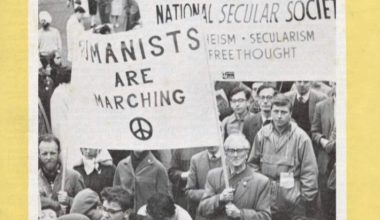
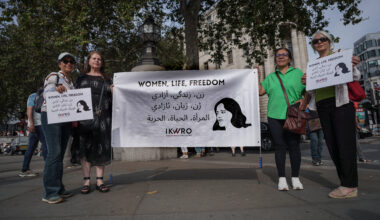
1 comment
Let me add my appreciation for the great work that Terry did tirelessly over the decades for gay rights. To stick at it for so long is a great virtue.
(It is rather a pity that nobody noticed the error on the otherwise fine tombstone; perhaps it is not too late to restore the missing possessive apostrophe?)
Your email address will not be published. Comments are subject to our Community Guidelines. Required fields are marked *
Donate